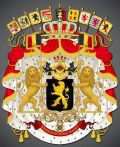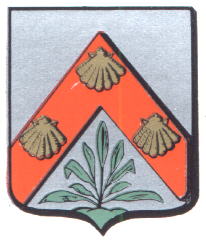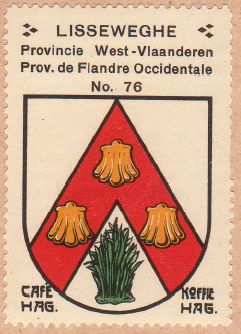Lissewege: Difference between revisions
Knorrepoes (talk | contribs) m (Text replace - "{|width="100%" style="color:black; background-color:#ffffcc;" |width="15%"|50 px|left |width="70%" align="center" |'''Heraldry of the World<br/>Civic heraldry of Belgium - Belgische Gemeentewapens / [[B) |
Knorrepoes (talk | contribs) m (Text replacement - ".jpg|center]] ====Official blazon====" to ".jpg|center|Wapen van {{PAGENAME}}]] ====Official blazon====") |
||
| Line 5: | Line 5: | ||
Incorporated into : 1970 [[Brugge]] | Incorporated into : 1970 [[Brugge]] | ||
[[File:lisseweg.jpg|center]] | [[File:lisseweg.jpg|center|Wapen van {{PAGENAME}}]] | ||
====Official blazon==== | ====Official blazon==== | ||
Revision as of 17:18, 21 January 2016
Belgium heraldry portal
This page is part of the Belgium heraldry portal |
Heraldry of the World |
|
Civic heraldry:
|
Other heraldry: |
LISSEWEGE
Province : West-Vlaanderen
Incorporated into : 1970 Brugge
Official blazon
Een wit veld met eenen rooden keper waerop dry gulden St-Michielsschelpen, en beneden vergezeld van eenen bos groene biezen ryzende op eenen aerdkluyt van dezelfde kleur.
Origin/meaning
The arms were granted on October 28, 1840.
The arms are first seen on a 17th century map of the Free Territory of Brugge (Brugse Vrije). The chevron most likely was the symbol of the Lords of Dudzele. The shells are officially described as shells of Saint Michael, but more likely are the symbol of St. James, as one of the main roads of the pilgrims to the grave of the saint in Santiago de Compostella (Spain) originated in Lissewege.
The base of the arms shows a canting reed plant (lis=reed mace).
| The arms in the Koffie Hag/Café Hag albums +/- 1930 |
Contact and Support
Partners:
Your logo here ?
Contact us
© since 1995, Heraldry of the World, Ralf Hartemink 
Index of the site
Literature : Servais, 1955













